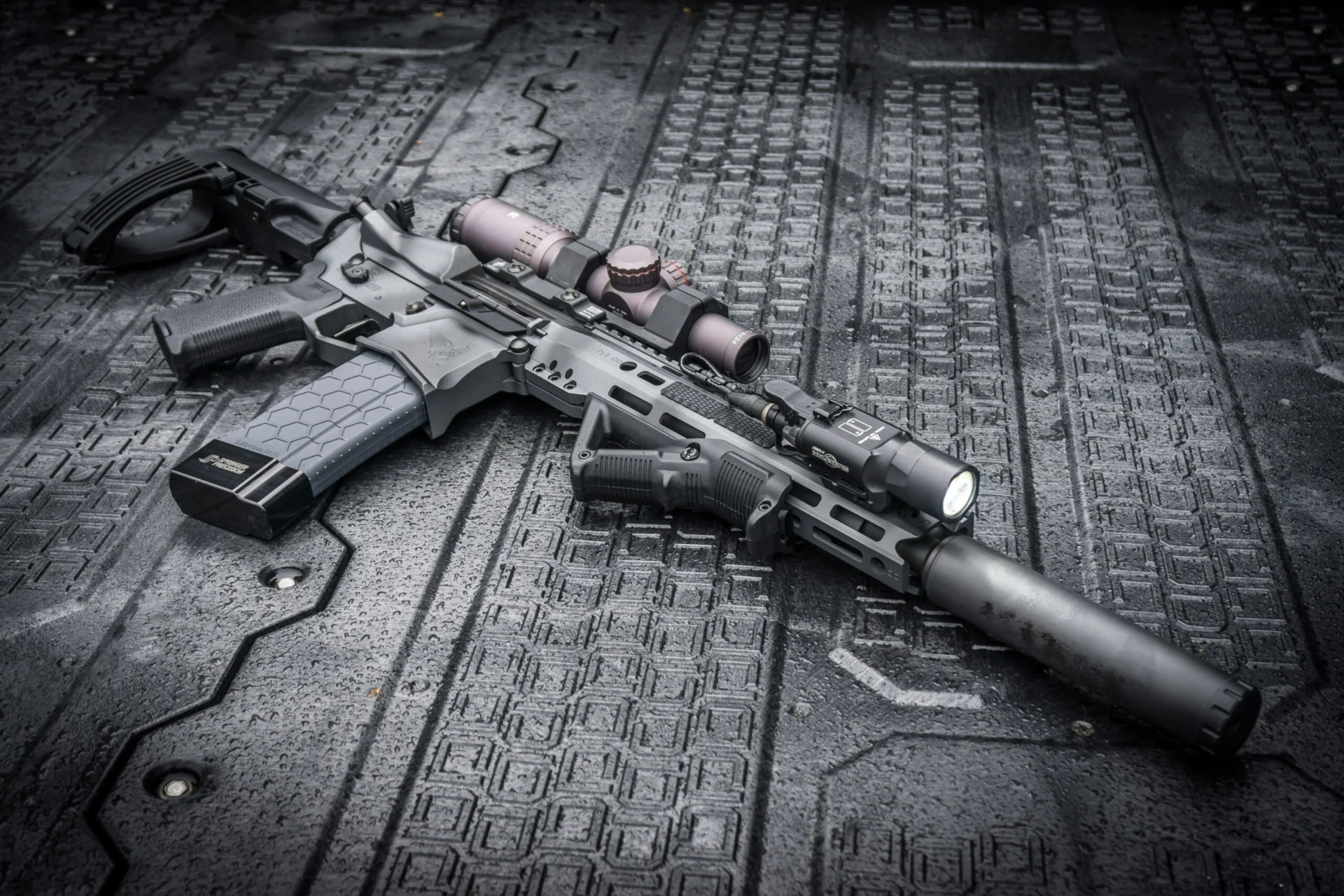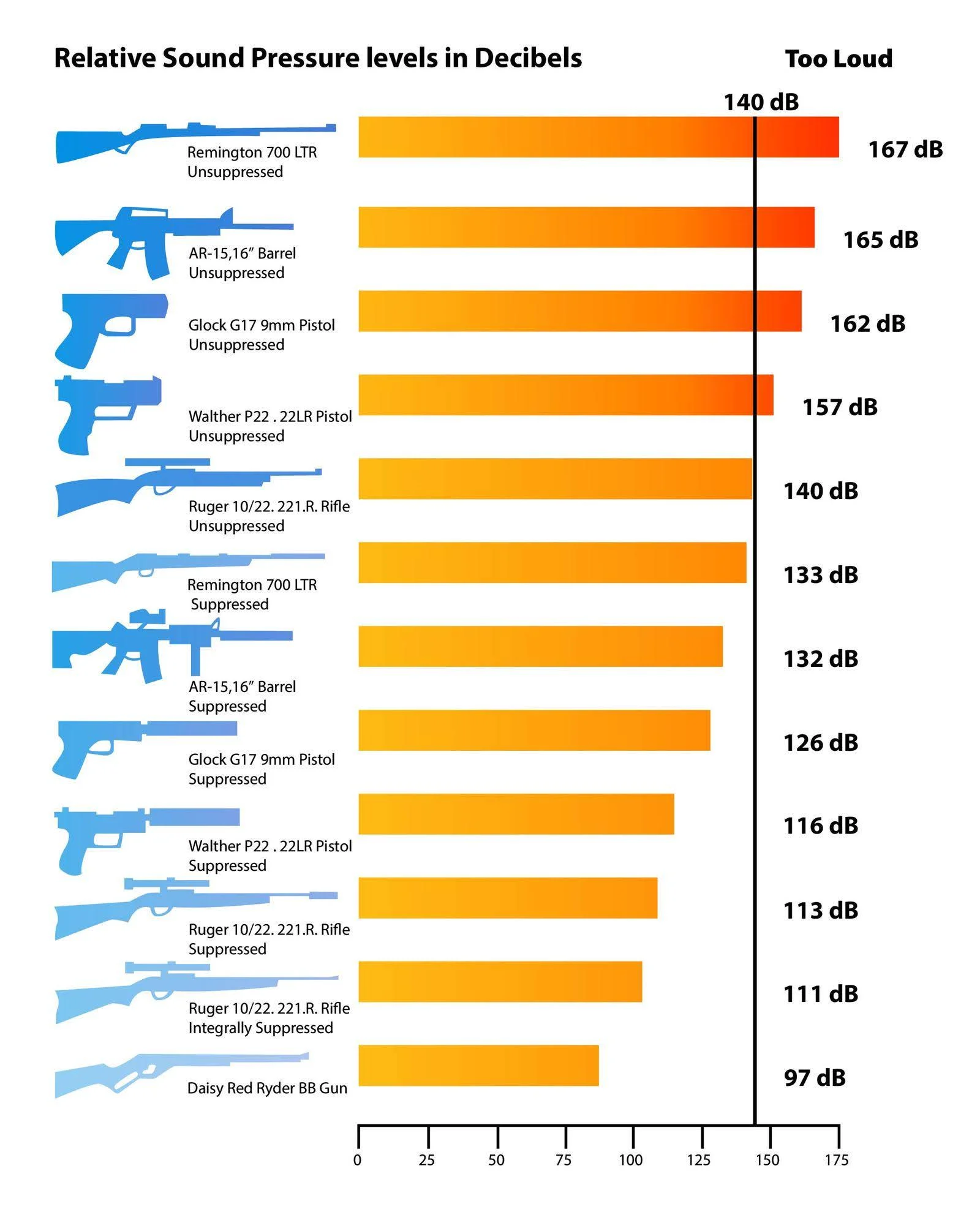Suppressors, often referred to as “silencers,” have become increasingly popular among hunters, sport shooters, and firearm enthusiasts. Despite their portrayal in movies as tools for stealth, suppressors are primarily designed to reduce noise, recoil, and muzzle flash—improving safety and shooting accuracy.
Let’s explore the science behind suppressors, how they function, and the benefits they provide for shooting enthusiasts.

What Is a Suppressor?
A suppressor is a cylindrical device attached to the muzzle of a firearm. Its primary purpose is to dampen the sound and pressure produced when a gun is fired. While Hollywood often portrays suppressors as making gunshots whisper-quiet, the reality is far different. Instead, they reduce noise to safer levels, akin to wearing ear protection.
How Suppressors Work
To understand suppressors, it’s important to break down what causes a gunshot’s noise:
1. Expanding Gases:
When a round is fired, gunpowder ignites, generating high-pressure gases that propel the bullet forward. As these gases rapidly escape the barrel, they create a loud “crack.”
2. Supersonic Bullet Crack:
Bullets traveling faster than the speed of sound (approximately 1,125 feet per second) produce a secondary noise—a sharp crack caused by breaking the sound barrier.
The Role of the Suppressor
Suppressors work by capturing and redirecting the expanding gases that cause the initial explosion.
• Internal Baffles:

Suppressors contain multiple chambers, or baffles, designed to slow and cool the gases as they move through the device. This reduces pressure and noise before the gases exit.
• Gas Expansion:
Instead of releasing high-pressure gases all at once, suppressors allow the gases to expand gradually. This process minimizes the sharp sound associated with rapid expansion.
• Reduced Muzzle Flash:
By cooling the gases, suppressors also reduce the visible muzzle flash, which can be an advantage in low-light shooting situations.
What About Supersonic Noise?
Suppressors can’t eliminate the crack caused by bullets traveling faster than sound. However, this noise can be further reduced by using subsonic ammunition, which travels below the speed of sound. The combination of a suppressor and subsonic rounds significantly lowers noise, although it may sacrifice range and velocity.
Benefits of Suppressors
1. Hearing Protection
According to the Centers for Disease Control and Prevention (CDC), exposure to noises above 85 decibels can cause hearing damage. A typical gunshot measures between 140–165 decibels—well above the danger threshold. Suppressors can reduce this to around 120–130 decibels, comparable to the noise of a jackhammer.
This reduction protects shooters from long-term hearing loss and eliminates the need for bulky earmuffs, which can interfere with communication and situational awareness.
2. Improved Accuracy
Suppressors reduce recoil and muzzle rise, allowing shooters to maintain better control and aim. This is particularly beneficial for hunters, who may need quick and accurate follow-up shots.
3. Reduced Noise Pollution
Whether shooting at a range or hunting in the field, suppressed firearms are less disruptive to nearby residents and wildlife. This can help protect hunting lands from noise complaints, ensuring their availability for future generations.
4. Better Training Environment
New shooters often flinch in response to loud gunfire and recoil. Suppressors create a quieter and more manageable shooting experience, making them excellent tools for firearm training and education.

Legal Status of Suppressors
Suppressors are legal for civilian ownership in 42 states, including Missouri, where hunting with a suppressor is also permitted. However, they are regulated under the National Firearms Act (NFA), which requires:
• Submitting fingerprints and photos
• Passing a federal background check
• Paying a $200 tax stamp
• Registering the suppressor with the Bureau of Alcohol, Tobacco, Firearms, and Explosives (ATF)
While this process may seem complicated, many buyers find the benefits of suppressors worth the effort.
Common Myths About Suppressors
1. “Suppressors Make Guns Silent.”
False. Suppressors only reduce noise, typically by 20–35 decibels—similar to how a car muffler reduces engine noise.
2. “Suppressors Are Only for Criminals.”
False. Suppressors are used primarily for hearing protection, hunting, and sport shooting. Studies show that suppressors are rarely used in crimes due to strict regulations.
3. “Suppressors Eliminate Recoil.”
False. Suppressors reduce recoil but don’t eliminate it entirely. They make shooting more manageable, not recoil-free.
Are Suppressors Worth It?
For hunters and sport shooters, the advantages of suppressors far outweigh the legal hurdles. In addition to protecting hearing and reducing recoil, suppressors enhance accuracy and create a safer shooting environment.
As a Missouri hunter and business owner specializing in suppressors, I’ve personally experienced how these devices improve hunting experiences and shooting practice. Whether pursuing whitetail deer on my own property or training clients in firearm safety, suppressors have proven to be valuable tools.
Final Thoughts
Suppressors are more than Hollywood gimmicks—they are practical tools that enhance safety, performance, and enjoyment for shooters. By understanding how they work and staying informed about legal requirements, firearm owners can make educated decisions about incorporating suppressors into their gear.
And if you’re considering adding a suppressor to your collection, reach out to my Missouri-based business for expert advice and options.

